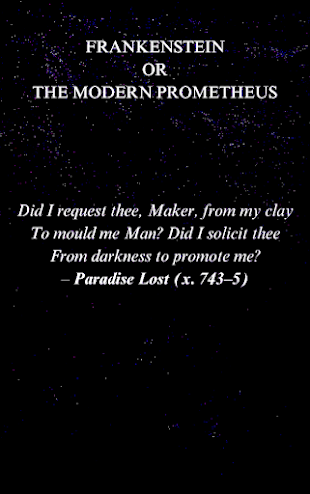Monstrosity and Morality in Frankenstein
The timeless Mary Shelley classic, "Frankenstein," is one of my favorite pieces of literature. An intricate tapestry of complex characters that explores profound themes, I find it truly inspiring and staggering that a girl in her teens could deliver the world such a phenomenal introspective masterpiece. Though originally published anonymously, given the misogyny prevalent in the 19th century, Mary Shelley stands as a paragon of ingenious science fiction authorship for authors all around the world today.
The subtitle of 'Frankenstein', 'The Modern Prometheus', refers to the Greek myth of Prometheus, who stole fire from the gods to aid humanity. Enraged by his defiance, Zeus punished him by chaining him to a rock, where an eagle ate his liver daily. Since Prometheus was immortal, his liver would regenerate each night, trapping him in endless torment. This myth parallels Victor Frankenstein’s ambition and the consequences of defying natural limits.
Victor Frankenstein, the protagonist of Mary Shelley's novel, defies the laws of nature by creating life itself through unconventional methods. He ignites the fire of consciousness within this creature, granting it the gift of life. Victor's rebellion against the natural order has devastating consequences. He faces the deaths of his loved ones, descends into isolation due to mental agony, and endures unbearable suffering before ultimately succumbing to death himself.
At first glance, one may assume that the 'monster' is the creature Victor brought to life. However, after navigating through the layers, the true epiphany hits: the real monster is humanity itself. The wretched, revolting, unsettling figure was more human than most of the characters in the novel. Imagine being abandoned by your parental figure as soon as you are born, imagine being constantly condescended to and treated like an outcast for something you cannot control, imagine having empathy and compassion regardless and saving a life while risking your own and still being perceived as some bloodthirsty beast. Stings, right? Eventually, the creation, too, like any average human would, descended into revenge and violence.
The inquiry into whether humans are inherently social beings presents a multifaceted quandary. Despite surface-level and anatomical parallels, categorizing individuals solely based on conscience proves challenging. Are we inherently predisposed towards malevolence or benevolence? If we are indeed products of our circumstances, how then do certain tormented souls maintain a capacity for empathy, while individuals ensconced in affluence exhibit abhorrent behavior? What impels us towards specific actions? The annals of human history abound with myriad tales of atrocious deeds, yet they are counterbalanced by a rich tapestry of narratives depicting acts of compassion.
The treatment of the creature by society reflects overarching themes of prejudice, alienation, and humanity's innate aversion to the unfamiliar or different. The relentless pursuit of scientific discovery yields dire consequences, shedding light on humanity's propensity for hubris and the ethical quandaries entwined with scientific exploration. In summation, while humanity possesses the capacity for both magnificence and abhorrence, it is our discerning choices and the principles we espouse that truly delineate our humanity.

